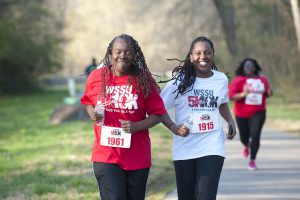The Physical Activity Guidelines Advisory Committee is composed of 17 nationally recognized experts in the fields of physical activity and health. These distinguished individuals agreed to serve on the Committee in a voluntary capacity to review current evidence and make recommendations that will help inform the next edition of the Physical Activity Guidelines for Americans. This post is part of a series of interviews with the Committee members to learn more about the men and women providing independent expertise and service to improve the health of the Nation.
Today, we are highlighting Dr. Melicia Whitt-Glover, President and CEO of Gramercy Research Group in Winston-Salem, North Carolina. On the Committee, Dr. Whitt Glover is a member of the Promotion of Physical Activity and Youth Subcommittees.
How do you stay physically active?
I’ve always been active. Growing up I ran track and played softball and soccer. Now I coach my kids’ soccer teams and I like to coax the parents onto the field to help the team practice. I know the team is relying on me, so I have to make time for practice, and I like to get the other parents involved, too. My mom recently decided to become more active and she also holds me accountable—we’ve started running 5K races together.

Tell me about some of your recent research.
My recent research has focused on the communication and messaging around physical activity. One study I conducted showed that churchgoers who received a tailored message that incorporated their faith with the call to be more active were more likely to be physically active, as well as sustain their activity over a 12-month follow-up period. A similar study with targeted messaging for men found that they were more likely to be active if they received a message that being physically active affirmed their accomplishments, their competitive nature, or their role as a man.
What do you think are some of the challenges/barriers that prevent people from meeting the Guidelines?
I work with lower income individuals. Many are single or very busy parents who work long hours, doing all they can to best provide for their kids, and physical activity isn’t on their list of priorities. If your focus is on serving others, then your own needs and your own health are never the priority. These individuals need a way to relate the importance of physical activity to their role in life. For example, as a mother, physical activity gives me an opportunity to spend quality time with my children, and will help me live longer so I can see my future grandchildren grow up. But the conversation can’t stop at messaging. Policies and environments must change to help these individuals incorporate and prioritize physical activity as part of their lifestyle.
If you had a magic wand to change one thing related to physical activity, what would you change?
I would change policies and environments to help normalize and encourage physical activity. Many individuals experience barriers to leading a physically active lifestyle; work demands, time, and family life are all competing priorities. However, there are steps we can take as individuals to help make daily physical activity commonplace; I’ve seen public health practioners wearing sneakers with their work clothing because it encourages them to walk more. I make a point to wear less formal, comfortable work shoes so that I can take frequent walk breaks throughout the day—but I realize this opportunity is a privilege due to my position at my firm, and is one that unfortunately not everyone shares.
~
The Office of Disease Prevention and Health Promotion would like to personally thank each of the members for their dedication and service on the Committee. The Committee’s independent review of the scientific literature is the result of thousands of hours of work and will culminate with the submission of the 2018 Physical Activity Guidelines Advisory Committee Scientific Report to the Secretary of the Department of Health and Human Services (HHS). HHS will use the report to develop the next edition of the Physical Activity Guidelines for Americans.